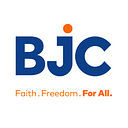Public school as a common good
By Dr. Stephen Breck Reid
“I believe…
And that there’s a place in heaven for those
who teach in public school.”
The singer songwriter Carrie Newcomer and Ayaan Ali Khan affirm the vocation of public school teacher in the poem/song “I believe.” But why should regular people care about public schools? Furthermore, why should Christians care about public education?
Biblical writers understood the importance of seeking the good of the broader community. Jeremiah tells the Hebrew exiles to seek the good for the city (Jeremiah 29). Education of the broader public became a matter of the welfare of the city, to use the metaphor of Jeremiah. “Public” became another way of talking about an institution that built a common life together.
Horace Mann in the 1800s promoted the common school movement, advocating the use of local property taxes to finance schools. For a century, public schools grew across the United States promoting a common experience of education. Public education increased the welfare and economy of the nation. During the Cold War, support for public education grew in hopes that the superiority of U.S. public education over education in Russia (USSR) would lead to peace through superiority. Public schools flourished until the level of diversity pushed the limits of race. The movement grew in a segregated world until 1954 when the U.S. Supreme Court ended de jure racial segregation in public schools in the landmark case Brown v. Board of Education.
Seeking the good of the city also meant bringing a cup of cold water to the disenfranchised. Public school views each student as a child of God, just as Jesus identifies with the poor, naked and hungry (Matthew 25:31–46). Public education broadens the prospects of students. I speak from firsthand experience — my public school taught me important lessons about the world and community around me.
I grew up African American in Dayton, Ohio. Like many cities in the mid-20th century, Dayton had de facto segregation through housing. My African American family lived in west Dayton — which bordered on the European American farmland in the county. After Brown v. Board of Education (1954), our school, Jefferson Township, was desegregated and taught us how to navigate a world in black and white.
Public school education broadened my horizons. During my time at Jefferson Township, I met students who came from different ethnic and religious backgrounds. However, segregation was still alive in the township, so I did not meet Jewish and Roman Catholic people until I left the public school. Kids from wealthy families and Roman Catholics went to the Catholic school: Chaminade. What I did not know was that Catholic and religious schools would be havens for those trying to avoid desegregated schools.
Public school was more than reading, writing and arithmetic. Public school included trips to the symphony and museums. It included band for kids who could afford instruments and choir for the rest of us. However, every student had access to the path to college or trade school. Access to a life with more prospects than our parents, Jefferson Township helped me get into Manchester College.
When I went to college in 1970, public schools were still strong. My small religious college in Indiana had a healthy education department preparing students to work in public. It turns out that by 2020, the same college (now a university) could no longer depend on education as one of its strongest majors. As the public support for public education dwindled, education departments did as well.
Public school and college opened the way to seminary and doctoral work and a career in higher education. We have four children. Three of them have taught or are teaching special needs children in public schools in California and Texas. Recently, I was asked to join the board of Transformation Waco, a local in-district charter partnership with Waco’s public schools. As someone who had benefited from public education, I could not refuse to serve public education, even if it was only as a board member.
I learned the wrap-around services of public schools have grown since my time as a student. Transformation Waco now provides services like meals for hungry students, eye exams, dental appointments, after school academies, telehealth for schools and other family resources to improve student learning.
Christian support for public education does not come down to advancing an institutional gain. On the contrary, it is an expression of the common good valued in Christian theology. It means seeking the good of the city and the neighbor (Jeremiah 29, Matthew 25). It comes from our confession of faith — not our self-interest. We have sisters and brothers in Judaism, Islam and other religions who join us every day in our support of public education.
You see, Carri Newcomer is right.
“I believe…
And that there’s a place in heaven for those
who teach in public school.”
Dr. Stephen Breck Reid is a Professor of Christian Scriptures at George W. Truett Theological Seminary at Baylor University in Waco, Texas.
